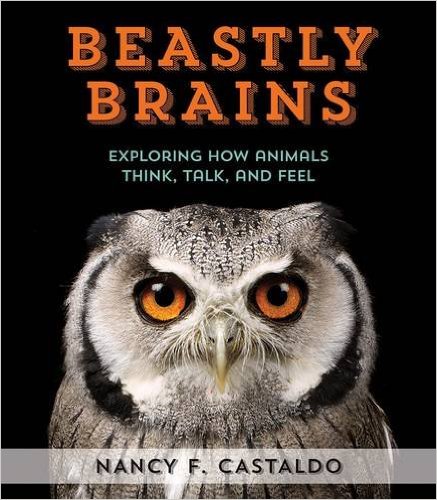Scientific evidence of nonhuman animals’ cognitive and emotional complexity is a vital part of the Nonhuman Rights Project. We bring it into court (in the form of affidavits submitted by ethologists and other animal experts) to help us demonstrate why it makes no sense to continue to treat all nonhuman animals as “things” under the law. But this science occupies an important place on our bookshelves, too—including kids’ bookshelves! After all, as Marc Bekoff writes, “children are inherently and intuitively curious naturalists,” and wasn’t Jane Goodall once a kid who spent hours in a hen-house to learn how hens lay eggs? The more Jane Goodalls we have in this world, the better, we think, and books that help kids gain a better understanding of other species are a great way to get started on that path.

That’s why we’re big fans of Beastly Brains: Exploring How Animals Think, Talk, and Feel (Houghton Mifflin Harcourt, 2017), a children’s nonfiction book by Nancy Castaldo, a writer, photographer, and environmental educator who became an NhRP supporter after learning of our chimpanzee rights case on behalf of Tommy. This lively, informative book, one of several Nancy has written about how we view and treat animals and the planet as a whole, delves into some of the same capacities, such as mental time travel and interspecies communication, that figure in our legal arguments. It also includes a section on the NhRP and Tommy’s plight.
Clearly, Nancy respects the curiosity and intelligence of her young readers, inviting them to reflect on how we treat animals using language that resonates with what we put before judges in our court cases: “The issue is no longer accepting that animals think,” she writes. “It’s now the challenge of figuring out how they think and what we will do with that information.”
Nancy kindly took the time to answer some questions about this book and her support for the NhRP as she prepares for the publication of her next book, Back from the Brink: Saving Animals From Extinction (Houghton Mifflin Harcourt, 2018):
Why do you think it’s important to encourage children and young adults to explore and engage with the science of nonhuman animal minds, communication, and emotions? What is it about children’s nonfiction in particular that appeals to you?
Learning about how nonhuman animals think, talk, and feel gives my readers a greater insight into the lives of animals, and hopefully, themselves. I want BEASTLY BRAINS readers to see that we are all connected. Perhaps that knowledge can spill over to how we relate and care for all the creatures who share our planet with us. I believe that my readers will one day become the future stewards of our planet. That gives me hope and the fuel to keep writing nonfiction for young readers.
In short—kids are awesome and they CAN make a difference!
When and how did you first become interested in the kinds of beings nonhuman animals are and how we treat them?
I was blessed with parents who instilled a sense of wonder in me and encouraged my exploration of the environment. My mom, for example, owned just about every book printed about dolphins. And I read every issue of National Geographic cover to cover each month. Not only was there enough reading material, but my parents allowed me to have a menagerie of animals—lizards, frogs, salamanders, turtles, fish, hamsters, rabbits, birds, cats, and dogs. We spent oodles of time exploring the outdoors. Those experiences shaped how I view the natural world and inspire my work.
https://www.youtube.com/watch?v=iPx1bwVRkIM
Throughout the book, you invite readers to imagine themselves into certain scenarios or reflect on their own experiences as a jumping-off point for considering what we have in common with other animals. What might you point to in our current moment that helps facilitate this kind of cross-species identification and empathy? What present-day obstacles do you see to humans (of all ages) identifying and empathizing with other animals (and/or changing how we treat them accordingly)?
Every visit to a farm, or a zoo, or a wild place, or viewing a nature show on television, provides an opportunity for us to reflect on our role on this planet and a chance for us to have empathy for nonhuman animals. The more we observe animals, the more we develop a deeper appreciation for their wonderful natures. Unfortunately, our increasing human needs often clash with our treatment of them. As population continually increases, so does our need for grazing land, agricultural fields, wood products, and water. Often these needs supersede the needs of wildlife. It is my hope that we can think about the future and the greater good when making some of these decisions about our present needs.
Thank you so much for highlighting the NhRP’s work in the last section of the book! Why did you choose to do this, and how did you come to support recognition of nonhuman rights?
I learned about Tommy in my local press and was compelled to drive up to see him. Unfortunately, I was not permitted to go anywhere near him, but that didn’t prevent me from taking in the situation and the horrific conditions where he lived. I knew I had to include his story in Beastly Brains. My belief is that we, nonhuman and human, all share this wide, beautiful planet, but as humans we have the added role of caretaker. It is our duty and privilege to respect all life. The NhRP has a terrific mission and, I felt, one that is important to share with my young readers. Including Tommy and the work of the NhRP gives my readers an opportunity to critically think about the issues of human rights as well.
We cannot protect and care for what we don’t understand. We cannot empathize with creatures if we do not form relationships. My hope is rooted in my readers.

Thanks, Nancy! We look forward to checking out your next book. 🙂
To learn more about Nancy Castaldo’s work, visit her website, and follow her on Twitter @NCastaldoAuthor.